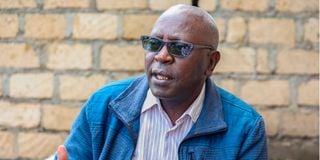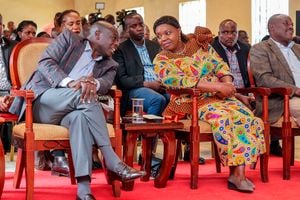The silent struggle: Narok's men break the chains of stigma

Paul Ololchoki Keriko, 62, during the interview in Narok County on September 24, 2024.
What you need to know:
- Paul Olochoki Keriko's initiative involves monthly forums where men meet and share their experiences, tribulations, fears, and worries, and solutions.
- It has so far roped in 30 men; Paul says a lot of men turn to alcohol and drugs due to problems they experience at home.
The scorching Narok sun beats down on Paul Olochoki Keriko's weathered face as he leads us down a dusty path. The air is thick with the scent of drying maize and the distant lowing of cattle.
We're far from the bustling Narok-Mai Mahiu Road now, deep in the heart of Narok North, where age-old traditions clash with modern struggles.
Our journey began just an hour ago, a 75km drive from Narok town. The smooth, busy Narok-Mai Mahiu road offered glimpses of vast tracts of land through the window – a beautiful scenery that appealed to the eye. Herds of cattle and goats grazed in some parcels, while in others, hundreds of acres of dried maize were being harvested. The scorching sun had come in handy for the farmers on this mission, blessing them with a bumper harvest this year.
Now, as we follow Paul, the landscape has changed. We're in a world where the United Nations Population Fund and the Centre for Rights, Education and Empowerment have been working tirelessly on initiatives against harmful cultural practices like gender-based violence, including female genital mutilation (FGM), and child marriage.
Paul's calloused hand grips his walking stick tightly as he recounts the day his world nearly shattered. "I could smell the acrid stench of my own despair," he says, his voice barely above a whisper. "The weight of expectation, of being a 'man', nearly crushed me."
As we sit down for an interview, he elaborates on his harrowing experience. "I underwent a nasty family dispute a few years ago that left me heartbroken," he reveals. "It sank me so deep into depression that I almost lost myself. It took the intervention of well-wishers to have me rehabilitated from mental breakdown through counselling."
But from the ashes of his personal crisis, Paul has risen to become an unlikely champion for men's mental health in this traditional Maasai community.
"I decided that I had to do something to rehabilitate other men in my community that were undergoing similar problems," he explains, determination gleaming in his eyes despite his physical disability.
"I would have died of depression had I not been helped out. I, therefore, did not want to see any other man face what I faced."
Once a month, under the shade of an ancient acacia tree, the air fills with something revolutionary: the sound of men talking openly about their feelings. Paul's initiative involves monthly forums where men meet and share their experiences, tribulations, fears, and worries.
"You can taste the fear in their voices at first," Paul explains, his eyes crinkling with empathy. "But by the end, there's a lightness, a sense of relief that's almost palpable."
As we sit in on one of these gatherings, the atmosphere is electric. Men of all ages huddle close, their colourful shukas a stark contrast to the serious expressions on their faces. One by one, they stand to share their burdens – stories of marital strife, financial pressure, and the crushing weight of societal expectations.
"During the monthly forums, men pour their hearts out," Paul says. "A lot of them are undergoing mental torture that have seen them sink into depression. Many men open up on challenges they are facing at home and workplaces, including being denied food, conjugal rights, gender-based violence, and being side-lined and neglected."
Read also: Signs of a miserable married man
The initiative has so far roped in 30 men, who also offer solutions to one another. Paul explains that a lot of men turn to alcohol and drugs due to problems they experience at home.
"Stigma is one of the key things that make men remain silent," he adds. "They fear becoming the laughing stock in the community once they disclose their challenges. Among the Maasai, men are not supposed to disclose how they have been mistreated by their wives or women."
Timothy Githinji, a recent convert to Paul's initiative, speaks with a tremor in his voice.
"Before I embraced the initiative, life was bad, it was chaotic and there was always violence at home," he admits.
"Now, we are living in harmony and I am now helping my wife to run the family. Before, my home was a battleground. Now, it's filled with the laughter of my children and the sweet aroma of my wife's cooking. I've learned to be a partner, not just a provider."
The success of Paul's grassroots movement is a beacon of hope in a country where men's mental health statistics paint a grim picture. According to a 2022 report by the Kenya National Bureau of Statistics (KNBS), 56.9 per cent of men have mental disorders against 43.1 per cent for women. The report also indicates that men have higher suicide rates compared to women, reflecting the urgent need for mental health interventions.
Paul's initiative, however, faces its own challenges.
"We need professional counsellors to help some of the members struggling with mental health," he explains. "We also need motivational speakers to come and speak to the men to open up their minds and give them hope in life. We ask those who can help us in giving pro-bono services to do so."
Read also: Why more men than women take their own lives
Despite these hurdles, he remains optimistic. "I'm happy with the impact of this one-year-old initiative," he says proudly. "I've noticed a great change in the lives of participants. I hope to roll out the initiative to all the other five constituencies in the county to reach more men with similar challenges once funds are available."
As the sun dips below the horizon, casting long shadows across the savannah, the men begin to disperse. The air is filled with a palpable sense of relief, of burdens shared and understood. Paul's eyes gleam with determination in the fading light.
"This is just the beginning," he declares, his voice strong despite his physical disability. "We will break the silence, one man at a time."
In the gathering twilight, each man carries a little less weight on his shoulders. The night air is filled with possibility, and the promise of a new dawn for Narok's men. Here, a quiet revolution is unfolding – one that challenges age-old notions of masculinity and offers a new path towards healing and understanding.
As we make our way back to Narok town, the bumpy road a stark contrast to the smooth highway we travelled earlier, we can't help but feel we've witnessed something profound.





